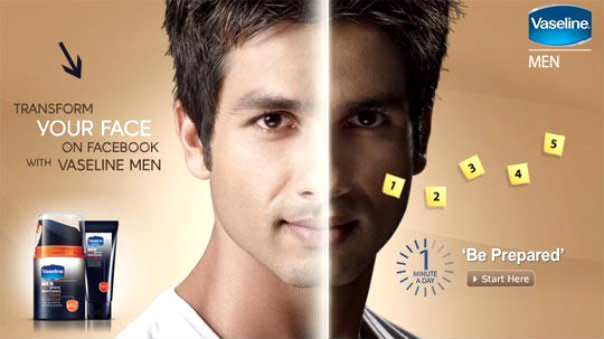 The Upshot
The UpshotVaseline ad campaign sparks controversy over skin-whitening creams

A new Vaseline ad campaign in India urging men to whiten their faces has sparked international controversy, with critics of the ads contending that Vaseline — a subsidiary of the Dutch-Anglo conglomerate Unilever — is promoting the notion that only white skin is beautiful. But in India and in other countries, face-whitening creams — and all their accompanying cultural hangups — are nothing new.
Unilever released a Facebook application that permits men to upload photos of themselves and then "transform" their profile photos by lightening them, much like they promise their new lightening cream will do. The company recruited Bollywood star Shahid Kapur to be the face of the campaign.
According to an Agence France-Presse report, advertisements for skin-whitening creams have been controversial since the first cream for women hit the Indian market more than 30 years ago. Men are a more recent target of the $500 million-per-year industry in India.
[Before and after: Kim Kardashian retouched in ad]
Detractors say the whitening industry's ads are manipulative and racist. Brinda Karat, general secretary of the All India Democratic Women's Association told AFP that a 2003 advertisement featuring a dark-skinned woman who couldn't catch a husband was "highly racist." Another advertisement in 2008 (flagged by the Independent) featured a man thinking of leaving his dark-skinned girlfriend for a lighter-skinned rival.
Unilever is defending its Vaseline ad campaign as culturally appropriate. "Much like self-tanning products in North America and Europe, skin-lightening products are culturally relevant in India," the company said in a statement, according to CBS News.
A skin-whitening defender writing in the Wall Street Journal argued that Indians should be allowed to buy the creams without people in the West worrying they are being "brainwashed."
"In a country where a dark complexion is seen as a liability, a deal breaker for putative nuptials, a stumbling block for one’s career prospects and — correctly or not — a marker of one’s standing in the caste hierarchy, the skin-whitening industry does well," writes Rupa Subramanya Dehejia in the Journal.
India's system of social stratification based on lighter skin color is rooted in the country's ancient caste system.
A 2009 poll by an online dating company of 12,000 participants living in Northern India found that they rate skin tone the most important factor in choosing a romantic partner. "Fair skin is generally associated with beauty, greater affluence and increased employability," writes Riddhi Shah at Salon, who copped to using the creams herself even while criticizing the country's racist ideas about beauty in her work.
Whitening creams hold an appeal for men and women in the United States, too. A New York Times investigation found many African-American and Latino women support a robust U.S. market for over-the-counter whitening creams. And it's not just women: Former Chicago Cubs player Sammy Sosa admitted he used the creams.
But the Times also found that many women suffered severe side effects from the products, some of which contain steroids. A Harvard study flagged by the blog Colorlines found that 90 percent of Arizona women suffering from mercury poisoning were Hispanic women using skin-lightening creams. "These women had tried so desperately to whiten their skin color that they had poisoned their bodies by applying mercury-based 'beauty creams,' " a Harvard medical professor wrote in the Boston Globe.
[Image of ultra-thin Ralph Lauren model sparks outrage]
Other popular Yahoo! stories:
• Chelsea Clinton's secret wedding plans emerge
• Cold War over, spy games move east
• Bizarre prehistoric species found in ocean

